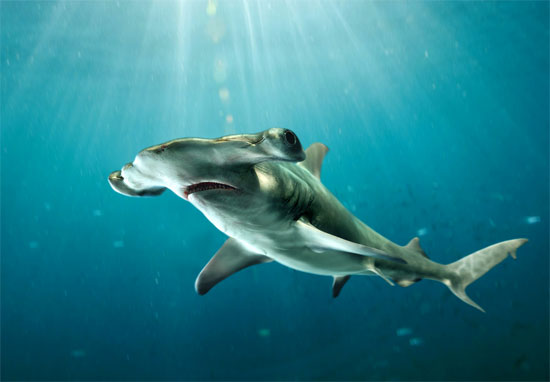The international community raises the level of shark protection
Representatives of 178 countries agreed to raise the level of protection of three endangered sharks during the international conservation conference in Thailand.
The Convention on International Trade in Endangered Species (CITES) takes place in Bangkok, Thailand from March 3 to March 14. In a vote on March 12, two-thirds of the delegates agreed to upgrade the protection of three commercially viable sharks, but are facing extinction. These include white-headed sharks, sharks (belonging to the Lamnidae shark) and hammerhead sharks, the BBC reported.

Hammerhead sharks are a valuable asset to the tourism industry of South America.
Although raising the level of protection of three endangered sharks is approved, their trade is still not prohibited. Countries that export and import three species will have to issue permits to control the quantity. If a country sells or buys shark products more than it allows, they will be subject to CITES sanctions.
Environmental protection organizations welcome voting results, considering it a historic turning point in shark protection. However, this result can still be reversed in a vote in the closing session of the conference in the next few days.
The number of white-headed sharks and sharks, and hammerhead sharks are declining sharply for several years due to overfishing for shark fin demand.
The conservators have tried to influence CITES conferences to increase the level of protection for sharks since 1994. However, their efforts have always been met by Chinese and Japanese protests. The situation has changed thanks to the awareness of South America. South American governments understand that live sharks are valuable assets for the tourism industry.
"They realized that tourists enjoyed watching sharks, especially hammerhead sharks," explains Dr. Colman O'Criodain, an expert at the International Nature Protection Fund.
- The international community raises the level of protection of Hoan Kiem turtles
- The European Union banned shark fin cuts
- Big sharks eat small sharks
- The first shark in history to know ... vegetarian but still healthy
- Incidentally: The caught shark in Quang Ninh is listed in Red Book
- Procession of disease because of eating micro-fish soup
- Install a super-sensitive camera on the shark's body
- Catch sharks from prehistoric times
- Catch a shark with a body like a snake, a mouth of 300 teeth
- The first 'vegetarian' shark in the world
- Introduce the shark shark bracelet
- Dolphins set up societies to compete for partners
 Vietnam 5th Asian champion on fuel-efficient vehicles
Vietnam 5th Asian champion on fuel-efficient vehicles We can read all NASA studies completely free of charge
We can read all NASA studies completely free of charge Singer and songwriter Bob Dylan won the 2016 Nobel Prize for Literature
Singer and songwriter Bob Dylan won the 2016 Nobel Prize for Literature Scientific revolution in Asia
Scientific revolution in Asia